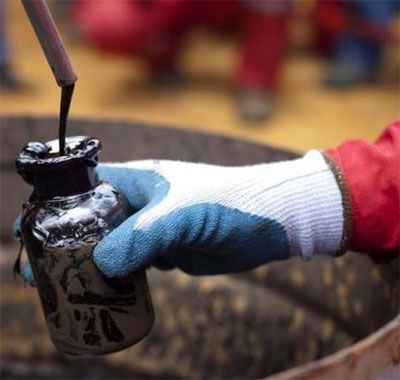
NELP model encourages silos leading to higher cost, poor expertise; govt fails to build data repository
The story of gas flowing from two of Oil and Natural Gas Corporation’s blocks to the adjacent Reliance Industries units off the Andhra Pradesh coast would not have unfolded in the current manner had the Indian companies followed the global model of collaboration.
Indian oil and gas exploration companies work in silos without any exchange of data or optimum use of infrastructure.
On the contrary, in the Gulf of Mexico world’s top four companies -- Chevron, British Petroleum, Exxon Mobil and Shell operate in close collaboration despite being biggest competitors.
“The competition cannot be more doggy dog than what is among these four, yet they collaborate sometimes even within just nine square miles,” said India head of one of the oil companies.
Part of the blame lies with the directorate general of hydrocarbon which has been unsuccessful in facilitating cooperation.
Indian public and private exploration and production companies say had DGH played its role of data sharing well, the RIL-ONGC conflict could have been avoided.
DGH being the nodal agency of Ministry of Petroleum and Natural Gas on upstream exploration and production receives data from operators after the New Exploration Licensing Policy regime came into effect.
“One major role of DGH is to store and disseminate this precious oil field data of India,” DGH says on its website.
Oil industry has always required a lot of cooperation and spreading of risks, said Michiel Soeting, global chairman, energy and natural resources sector, KPMG.
“At the same time, different companies operating in the North Sea design their own operating system.
"Why can’t there be more standardised designs? Why can’t they make use of what we interestingly see in the automobile industry,” he said.
Ten years ago, there was a lot of price pressure on auto companies. But they survived by collaborating. The display used in Volkswagen is same as what is seen in Toyota or Mercedes.
“There is lot of standardisation in automobile which is also now the trend in oil and gas industry,” Soeting added.
R S Butola, former chairman, Indian Oil Corporation, who headed ONGC Videsh Ltd, the overseas arm of ONGC, during its peak acquisition period, said there was a fundamental difference between the Indian and international markets.
“The environment has become such that if they form a consortium with some company, eyebrows will be raised.
If they were to operate as autonomous company they would form consortium at the time of bidding itself because some blocks require advanced technology.
This needs to be addressed by the government,” he said.
Butola, however, said there should be drivers for collaboration which could be either higher technology, sharing of reservoir or price incentive.
Else, data is proprietary information collected after a lot of investment.
“Across the world, companies acquire data through surveys, but if they don’t develop an area, then the government asks them to give back the block along with the data.
This information is then shared with other companies.”
Industry players say had ONGC and RIL shared data with each other, both companies could have saved themselves of the stalemate.
Unitisation agreement attaching value to production of quantities ascribed to each side is important.
Besides, infrastructure facility that RIL built for its KG block could have been used by ONGC easily for its activities.
Anish De, partner, KPMG said the Indian market was less mature than the global industry.
“Besides, we follow the auction process and the NELP model of committed work programme whereas in the West companies hold acreage and deploy investment according to it. There’s a big difference.”
Soeting said, unlike North Sea, in India there was probably no need to collaborate because the market wasn’t dictating.
“In low oil prices, there is a need to survive whereas industry here has been protected.”
In July 2013, RIL and ONGC also agreed to share RIL’s existing infrastructure.
However, after ONGC filed a lawsuit in May 2014, accusing RIL of pilfering gas from its field, things turned sour between the two.
ONGC’s D5 block sits next to RIL’s flagging D6 block.
If ONGC doesn’t use RIL’s infrastructure, it will lead to higher capital expenditure for the government-controlled energy explorer for much lesser volumes. ONGC had initially planned to invest up to Rs 40,000 crore (Rs 400 billion) in the D5 block.
RIL had set up its D6 infrastructure keeping in mind a production capacity of 80 million metric standard cubic metres per day (mmscmd) of natural gas.
However, it is producing only 11 mmscmd currently.
As a result, much of its infrastructure is lying idle.
On the contrary, in the Gulf of Mexico, firms not only collaborate to save on costs but also to gain from mutual expertise and unlock marginal fields. In the North Tapti field, ONGC and Cairn India share infrastructure and work together, resulting in substantial cost savings for both the companies.
DGH has been working to build a national data repository (NDR) for the past 17 years. It says the NDR would be fully functional only by March 2016.
FUEL FOR THE OIL RACE
Drivers for Collaborations in Oil Sector
- Joint venture or consortium approach at the time of bidding itself to spread risks
- Market-driven pricing regime which requiresefficiency and optimisation
- Common reservoir where agreement is reached for unitisation
- To get technology for dealing with challenging geology
Why India Does Not Have Collaboration?
- PSUs reluctant to join with private firms
- Pricing and marketing controls on upstream production leaves no incentive
- Post-bidding development of acreages linked to committed work programme, leaving little scope for later tie-ups
The image is used for representational purpose only. Photograph: Reuters











 © 2025
© 2025